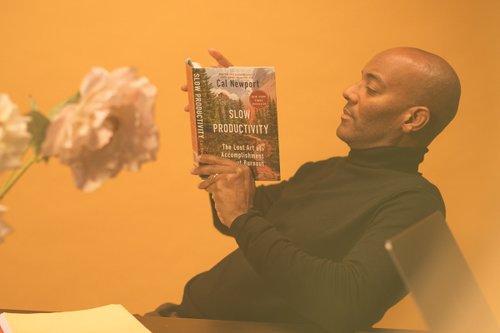Becoming blue-collar: Adelle Waldman uncovers the reality of part-time work
Jul 11, 2024
11 mins


US Editor at Welcome to the Jungle
Adelle Waldman’s new novel Help Wanted thrusts readers into the bustling aisles of a big-box store, where workers grapple with the stark realities of low-wage, unpredictable labor amidst the backdrop of the elusive American Dream. With a narrative rich in humor and sharp social observations, Waldman lays bare the daily adversities and systemic disparities her characters endure—workers who seek not just to survive but to find respect and upward mobility in a society that frequently marginalizes them. The novel’s exploration of these societal issues is a compelling call to action, igniting a spark of awareness and inspiring readers to consider the challenges the average blue-collar worker faces.
While Help Wanted is a work of fiction, Waldman’s narrative is deeply rooted in her personal experiences. To gain a deeper understanding of the daily reality her blue-collar characters face, Waldman became one—a merchandise unloader with a gritty pre-dawn routine, all for a whopping $12.25 an hour. What motivated her to immerse herself in this environment, and what societal lessons did she glean?
We spoke with Waldman about the drive behind her decision to step into the shoes of the working poor and discussed the profound societal truths she uncovered through this eye-opening experience.
Could you talk about what you aimed to understand from this experience and how it directly informed the development of your characters and the depiction of their workplace dynamics?
The short answer is that Trump won the election in 2016, and I found myself deeply unsettled. I had previously written a novel about writers in Brooklyn, but after the election, I lost interest in writing another novel about the personal problems of well-educated middle- or upper-middle-class people. To better understand life outside my particular milieu, I got a job at a big-box store.
In the past, I had worked low-wage jobs. When I was in high school and college, I was a bagger at a grocery store, I worked at Starbucks, I was a waitress, etc. But I was an adult when I got the job at the big-box store. It was a different experience. I found that my coworkers defied the stereotypes I had inadvertently absorbed from cultural narratives about low-wage workers—the idea that they are unreliable or suffer from addiction or mental illness, and that’s sad, but it’s also why they’re stuck in these jobs.
In fact, my coworkers were incredibly hard-working and reliable. They arrived for work early, to be ready to clock in the second their shift began, and were eager to sign up for extra hours whenever they became available. Many of them had been at the store for years. In the six months I was there, the only person on our team who quit was me. They taught me how to do the job, which literally kept the store running—we were responsible for unloading trucks of new merchandise that arrived at the store at night and getting the goods onto the store’s shelves before it opened to customers.
Meanwhile, whatever raises my coworkers got from year to year were tiny, barely covering the cost of living, and the opportunities for advancement were minimal, given that the structure of a big-box store requires many more rank-and-file workers than managers. Many times, more hardworking, reliable, qualified rank-and-file workers could have been promoted to manager [rather than those already] in management positions. Hence, most of my coworkers languished for years in these low-paying part-time positions.
In Help Wanted, you use dark humor and sharp social observations to explore systemic injustices in labor. How did your personal experiences translate into crafting the narrative’s focus on these societal issues?
One of the most eye-opening revelations was the issue of part-time work, which I wasn’t aware of as an issue before I started the job. Like many middle-class people, I assumed the most crucial thing to fight for was a higher minimum wage. I had no idea that for many workers, an even bigger issue is hours.
But perhaps I should explain. The store I worked at has, in the past ten or twenty years, moved toward a part-time labor force, in which workers’ hours constantly fluctuate based on how busy the store is. Instead of getting 40 hours of work week in and week out, one week someone might get only eight hours, the next week they might get 39—but never, ever 40 hours because our employer didn’t want to come close to having to pay overtime.
The variability and unpredictability—never knowing how much you’d be making in a week or two weeks—created an impossible situation for people trying to manage their lives. After all, income is a function of two numbers—hourly wage times the number of hours worked. So, if you raise the hourly wage without addressing the fact that many workers are scheduled for far fewer hours than they need, you don’t necessarily help as much as you think. Most people need a reliable paycheck, the kind that comes with at least 30 or 40 hours of work, to make ends meet.
I came to learn that this issue isn’t exclusive to a single employer or big-box store. The shift to part-time work is systemic, something that has happened across chain retail in recent decades due to pressure to keep consumer prices low in order to remain competitive with the largest retailers and e-tailers. As a result, what used to be stable, full-time jobs have deteriorated into subsistence-level positions, with workers shouldering the unpredictability and anxiety in what Yale political scientist Jacob Hacker has called “the great risk shift,” in his book of the same title.
Retailers operate this way because it is profitable. Shifting risk to workers—no longer guaranteeing them a stable 40 hours of work each week–reduces employers’ labor costs significantly. But the worker suffers. In the old days, we considered it an employer’s responsibility to bear the downside risk of employing people for 40 hours a week, week in and week out. The workers got stability while the corporation bore risk in exchange for the upside of profits. Now, as much risk as possible is passed on to employees, while the upside—the profit—still goes to the employer and its shareholders.
Your story explores the diverse challenges ten workers face, united in their desperate need for stable schedules, additional hours, and benefits—all denied due to restrictive store policies and happily enforced by their problematic manager, Meredith. Why did you choose to showcase these managerial dynamics, and what broader commentary were you aiming to provide about the systemic issues within corporate leadership and ethics?
In the book, I deliberately portrayed three different managers. I wanted to feature these varied personalities to show that the problem isn’t just one bad manager but the system itself. Meredith serves as a convenient scapegoat for the workers’ frustrations, but as irritating as she is, their real issue is the larger system they’re trapped in, in which it is so hard to move up or make enough to live on.
Another reason, though, to feature multiple personalities is because I wanted to show that the job isn’t all doom and gloom. The workers, too, have distinct personalities and a lot of humor and camaraderie. To me, it was important to have a comic plot full of different personalities because I never wanted to suggest that just because my characters are members of the working poor, that is all they are. They are also people with agency, capable of hatching plans, making alliances, and feeling camaraderie. In this sense, the novel feels like any workplace novel set among middle-class characters in an office.
To be honest, I tried to keep my politics out of the novel itself and just tell a good story. I tried to present the background work conditions accurately, without getting on a soap box, but even this—documenting the reality—can in itself feel like a political act in that it tends to be a bit disturbing to middle- and upper-middle-class people who have worked mostly white-collar jobs and who have tended to believe that the system is reasonably fair.
So, do you believe the system in the US is rigged?
Yes, I do think the system is rigged against workers at the bottom rung of the income ladder. The challenge isn’t just with individual managers or bad policies at specific companies; it’s structural. We’ve created a system in which corporations are rewarded and celebrated for increasing profitability, no matter how they do it—it doesn’t have to be through developing innovative products that people want to buy or by providing services better and more efficiently than competitors. It’s far more risky to commit funds to research and development of new products that might not pan out than it is to find creative ways to cut labor costs, and both are rewarded the same in the system we have now. If we want to change this, we need to incentivize companies not to cut costs at the expense of workers’ livelihoods and to instead seek other, more productive ways to increase their profits.
In this sense, I think the conventional wisdom about low-wage workers hasn’t helped. In the US, we have this singular notion that the pathway out of low-wage jobs is through higher education. And it is, on an individual level—the best thing any one person can do to increase their earning power in society as it is structured is to get an education, preferably a college degree. But this is a solution for individuals, not a systemic solution. Our society depends on people who work retail, who make sandwiches, who serve coffee—these jobs are essential, as we said over and over again during the pandemic. People working them deserve to be paid fairly regardless of whether they have a college degree. They deserve better than being told that they have no right to ask for dignity and a living wage because it’s their own fault they are where they are—as if they deserve nothing simply because they haven’t gone to college.
After all, in the 1930s, FDR didn’t tell unionizing coal miners and steelworkers to simply get more education to escape poor conditions; instead, those jobs were transformed into dignified, middle-class positions, the idea being that people who work deserve dignity, regardless of how “high-status” the work is or isn’t. The same is true now. If, as a society, we are going to depend on this large pool of service workers, we must ensure they are treated with dignity. We should set a decent minimum standard for all workers, not just those with education.
Many of your real and fictional coworkers took pride in working at a well-known store despite facing daily challenges and injustices. Why do you think this is, and where does this pride come from?
When I started working at the store, I put my foot in my mouth a few times, assuming my coworkers would be cynical about the job and would appreciate me cracking jokes about how lame corporate was. This wasn’t the case—my coworkers did have criticisms, but they didn’t want to hear it from a new person like me. It took me time to appreciate how much pride many of them took in having worked at the store for years, knowing every aspect of the job, and in doing a good job and feeling like an important team member.
I came to see that this is a matter of survival, psychologically speaking. Most people want to work and want to feel good about the work they do. It was my own snobbery, the attitudes I carried with me from my own professional life among the college-educated and ambitious, that prevented me from realizing that a job like ours could be a source of pride. But I saw how much my coworkers deeply valued their positive performance reviews and the small raises that came with them. It’s only natural to want to feel useful and appreciated, especially when the rest of your life is often characterized by financial stress. At work, people could put aside worries about making rent or car payments and focus on the job. And in this context having a kind manager who noticed and praised good work mattered a good deal.
How do you view the evolution of the American Dream through the lens of your characters, and what does this say about the hopes and realities of today’s workforce?
My coworkers’ version of the American Dream, the thing they aspired to, was so basic: a stable 40-hour-a-week job, benefits, a place to live, and a car. For many, the prospect of owning a home seemed out of reach; their goal was to rent their own place, instead of living with parents or grandparents or roommates. Even this was often unattainable due to fluctuating paychecks, due to the fact the number of hours they worked fluctuated—this made even securing a lease challenging. Many of my coworkers lived with family out of necessity, because, in a different economy, their parents and grandparents had been able to buy houses, even though they didn’t have college degrees.
My co-workers’ modest aspirations—stable employment, a vehicle, and a rental home—seem entirely reasonable to me, especially in a country as wealthy as ours and given how hard they work. Did I even mention that my coworkers came into work at 4 a.m. most days? Meanwhile, the area where the store is located is full of huge estates, built along the Hudson River in the Gilded Age. We’ve got the Vanderbilts’ estate, the Roosevelts’, and many others. These were considered incredibly opulent in their day and for decades after. Apparently, however, they aren’t sufficient for today’s upper class, at least judging by the fact that in recent years, a co-founder of a famous tech company bought not one, not two, but three mansions along the Hudson River, for his part-time use. He is building his own private railroad to connect them. Meanwhile, just a few miles away, people like my coworkers walk to work in the middle of the night—through rain and snow and along dangerous highways not designed for pedestrian use—because they can’t afford cars.
Earlier, you mentioned the injustice of part-time schedules, meaning that the store had no obligation to give a set number of hours or adhere to a weekly schedule, leaving workers’ lives unstable. You even published a New York Times op-ed about corporations’ reliance on part-time workers as a way to cut costs. What changes would you propose to improve the working conditions and protections for part-time workers in the retail industry and beyond?
I think the problem requires a legislative solution at the federal level because it’s not something one company can change on its own without putting itself at a competitive disadvantage in the marketplace. That’s an advantage of legislation—it applies equally to everyone, meaning that no company is at a disadvantage in complying. To this end, I am developing a specific proposal into a policy paper, which is new territory for me as a fiction writer.
My proposal involves an amendment to the Fair Labor Standards Act (FLSA) of 1938, which originally created the 40-hour workweek and mandated overtime pay for additional hours. This was one of the signature achievements of the New Deal and one of the reasons the Democratic party, the party of FDR, was seen as the party of workers for decades after it was enacted.
The FLSA changed the game for workers, but it didn’t anticipate what would happen many decades later, when employers began to game the system not by overworking employees but by underworking them, relying on part-time workers from whom they could withhold benefits and bring on only when they needed them. As we’ve discussed, this approach has significant advantages from an employer’s point of view.
My proposed legislation would target large employers—not small businesses like coffee shops or bookstores, which may have legitimate reasons for hiring part-time workers. But why shouldn’t, say, Walmart, with 1.4 million employees, be required to hire a full-time worker instead of deliberately opting for two or three part-time ones whose hours it can manipulate? For large corporations, those with over 500 employees—you could even set the threshold at 1,000 employees—my proposed legislation would allow workers to choose between full-time and part-time status. It would be like signing up for health insurance. Workers would have an annual window in which they could switch their status from full-time to part-time. This would ensure that part-time work is not forced on them as part of a strategy to exploit them. By making it applicable only to big, deep-pocketed employers and limiting the window for switching to once a year, it would balance the needs of business with the needs of the workers, offering much-needed stability to low-wage workers.
Photo by Yuvraj Khanna for Welcome to the Jungle
Follow Welcome to the Jungle on Facebook, LinkedIn, and Instagram and subscribe to our newsletter to get our latest articles every week!

More inspiration: Future of Work

The Bear: When professional passion turns toxic
Carmy's workplace trauma isn't unique...
Dec 31, 2024

The youth have spoken: South Korea’s push for a four-day workweek
Is this the end of Korean hustle culture?
Dec 26, 2024

Cal Newport's Slow Productivity: Redefining success in a hustle culture
Is slowing down the key to achieving more?
Dec 19, 2024

Wellbeing washing: Are workplace mental health apps doing more harm than good?
Workers are struggling with mental health. Are employers approaching it the right way?
Dec 19, 2024

Dark side of DINKs: Working as a childfree adult
Having children comes with challenges. So does choosing not to.
Dec 11, 2024
Inside the jungle: The HR newsletter
Studies, events, expert analysis, and solutions—every two weeks in your inbox




